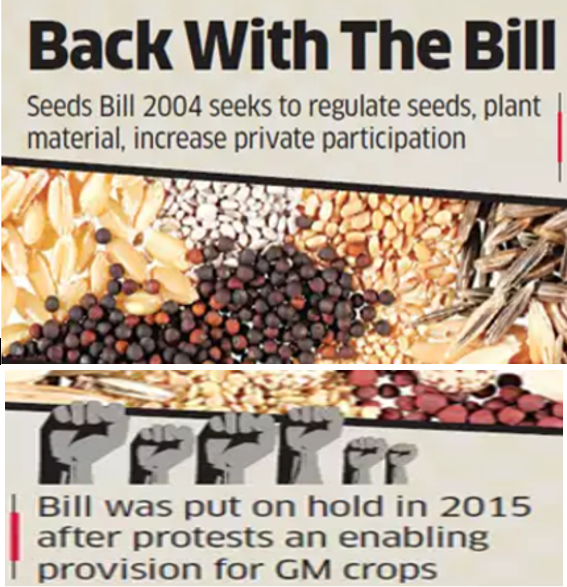Scientists, industry demand passage of new Seeds Bill, changes in policy
(Source – The Hindu, International Edition – Page No. – 4)
| Topic: GS3 – Agriculture |
| Context |
| ● On the second day of the National Seed Congress (NSC), experts, scientists, and industry representatives urged the government to modernize the Seeds Bill of 2004 and the Seeds Policy of 2002.
● They emphasized the need to align policies with current advancements in the seed sector and incorporate farmers’ concerns. |

Challenges with the Seeds Bill of 2004
- The Seeds Bill, introduced in 2004, was not passed due to opposition from farmers.
- Experts stressed the importance of revising the Bill to address changes in the sector over the past two decades.
- Collaboration between public and private sectors was highlighted as crucial for delivering high-quality seeds to farmers efficiently and affordably.
Weak Seed Quality Assurance System
- The existing seed quality assurance mechanisms, established under the Seeds Act of 1966 and Seeds Rules of 1968, are outdated and fail to meet international standards.
- Experts called for strengthening the system to ensure adherence to global benchmarks.
Need for Clear Definitions
- There is a lack of clarity in defining “farmer seeds” and “commercial seeds,” which needs to be addressed in any revised policy or legislation.
Strategic Interventions Required
- Experts advocated for a balanced focus on innovation, farmer empowerment, and policy reforms to create a resilient and globally competitive seed industry.
Conclusion
- Modernizing the Seeds Bill and policy is imperative to address sectoral challenges, promote innovation, and empower farmers.
- Collaborative efforts between stakeholders can ensure quality seeds are accessible and affordable.
| Seed Quality And Indian Agriculture |
| Importance
● Higher Yield: Quality seeds ensure better crop productivity and profitability for farmers. ● Resilience: Enhance resistance to pests, diseases, and adverse climatic conditions. ● Sustainability: Reduce the need for chemical inputs, promoting eco-friendly farming. ● Food Security: Play a critical role in meeting the food demand of a growing population. Challenges ● Outdated Policies: Existing legislation like the Seeds Act (1966) lacks relevance to modern agricultural needs. ● Low Quality Assurance: Seed certification standards are below international benchmarks. ● High Costs: Quality seeds remain unaffordable for many small and marginal farmers. ● Lack of Awareness: Farmers often lack knowledge about the benefits of certified seeds. Way Forward ● Policy Reforms: Modernize seed laws to reflect technological advancements and address farmer concerns. ● Infrastructure Development: Strengthen seed testing and certification facilities. ● Public-Private Collaboration: Foster partnerships to improve seed availability and affordability. ● Educate farmers: Enhance farmer awareness and extension services. |
| Practice Question: Discuss the need for revisiting India’s seed policies and the Seeds Bill of 2004 to address challenges in quality assurance, innovation, and farmer empowerment. Suggest measures to strengthen the seed industry for achieving global competitiveness. (150 Words /10 marks) |

